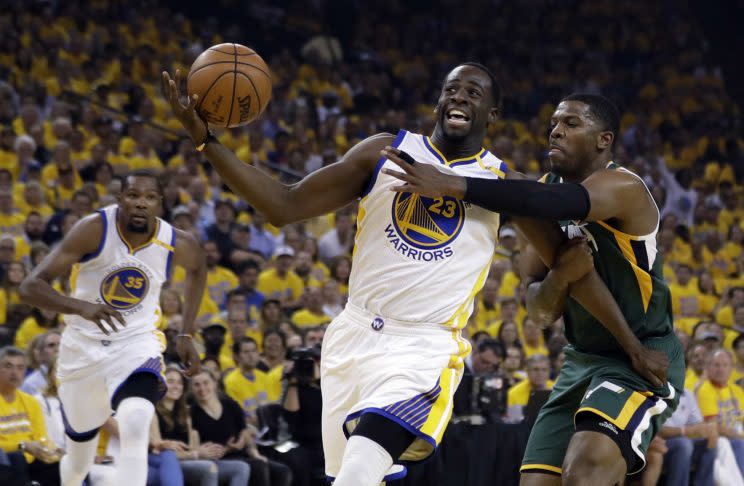The Warriors took care of business against the Jazz in a steady Game 1 win

The Utah Jazz are one of the few teams built to make life difficult for the Golden State Warriors. Their ability to enforce a slow pace and the talents of star center Rudy Gobert hold the potential to turn any series into a grind-it-out, half-court affair. That style plays against Golden State’s greatest strengths, and any team with hope of beating them in a playoff series has to find a way to push them out of that comfort zone. The Jazz entered their Western Conference Semifinals Game 1 on Tuesday night at Oracle Arena as major underdogs in the series, but they still had a chance to push the Warriors to their limits.
Utah learned in Game 1 why winning the pace battle and dominating the paint are prerequisites for winning, but not necessarily paths to victory. The Warriors hardly had the ideal night, and even made fewer 3-pointers than the more paint-focused Jazz. But they were never in serious trouble, controlled the course of the game from possession to possession, and offered nothing to suggest that they cannot make quick work of Utah to advance to the conference finals. Their 106-94 win was a businesslike affair that sets a clear tone for this series — it’s going to take a lot more than half-measures for the Jazz to pull out an upset.
That’s not to say the Jazz played poorly. In fact, many things went right for them. Golden State got opportunities to run and finished with an impressive 29 fast-break points, but it was hardly an end-to-end affair. Utah held Kevin Durant (17 points on 7-of-17 FG) and Klay Thompson (15 points on 6-of-13 FG) to relatively inefficient scoring lines, and allowed the Warriors to shoot just 7-of-29 (24.1 percent) from beyond the arc. Those are all real positives for an underdog playing in Oakland just two days after closing out its own seven-game first-round series on the road.
However, the Warriors are the clear favorites to win this season’s title in part because they can absorb playing below expectations in several, not just one or two, areas of the game. All it takes is a few players to step up, and their star depth ensures that someone is always there to do just that. The Jazz learned all that the hard way on Tuesday.
Stephen Curry and Draymond Green were the ones who paced the Warriors in Game 1. The former controlled the night from the first quarter, scoring 12 of his game-high 22 points in the opening period. Curry didn’t need to take many shots to get his points, but a combination of efficient conversion from the field (3-of-5) and the line (5-of-5) helped to give Golden State a 27-21 lead after one quarter.
Curry took only the third-most shots on the team for the game and finished 7-of-11 from the field, but his impact was felt early and extended through the fourth quarter. He only saw the court for a few possessions in the fourth due to an ankle problem, but it does not appear serious enough to keep him out for Game 2.
Meanwhile, the Jazz never got in a consistent offensive rhythm. They shot only 18-of-42 from the field and 4-of-13 from 3-point range in the first half, numbers that look even worse after factoring in Utah’s nine turnovers. Outside of a 10-point outburst for reserve guard Rodney Hood in the third quarter, no member of the Jazz found consistent success or even seemed to push the Warriors for more than a few plays at a time.
Four players finished in double figures, but none topped Gobert’s 13 points (5-of-7 FG) in 31 minutes. Gordon Hayward shot a rough 4-of-15 while guarding Thompson and Durant. No starter but Gobert made at least half his shots.
Good defense isn’t an individual enterprise, but Green surely deserves the most credit of anyone for the Warriors’ sterling effort at that end. He guarded a variety of positions, as usual, and particularly excelled when isolated in the post as part of a Jazz tactic that disregarded seasons of evidence that the Defensive Player of the Year favorite can guard bigger players inside.
Of course, Green is just as good in space. On one second-quarter possession, he stonewalled a 1-on-1 and then batted the ball away as the trailer created a 2-on-1. That defensive impact would have been enough to make Green one of the best players in the game, but he also scored 10 straight Warrior points over the last 1:35 of the third quarter and the start of the fourth to finish off the Jazz. His final line of 17 points, eight rebounds, and six assists isn’t overwhelming, but it didn’t have to be.
Utah can certainly play better in future games, if only because none of their players really excelled in Game 1. Hayward and Gobert are too good to turn in middling performances over the whole series, and Utah’s depth ensures that someone will go for 20 or more to help make these results closer.
But if we’re going to compare these teams by which has the potential to improve more, then it’s necessary to point out that the Warriors weren’t exactly firing on all cylinders, either. Perhaps no one took over because no one had to, but that proposition itself is a scary one for the Jazz.
The overarching impression of Golden State’s win was that it came rather easily, and it’s fair to assume the top-seeded Warriors have another gear should they need to access it. Game 2 could be the difference between a competitive series and a quick one.
– – – – – – –
Eric Freeman is a writer for Ball Don’t Lie on Yahoo Sports. Have a tip? Email him at efreeman_ysports@yahoo.com or follow him on Twitter!



